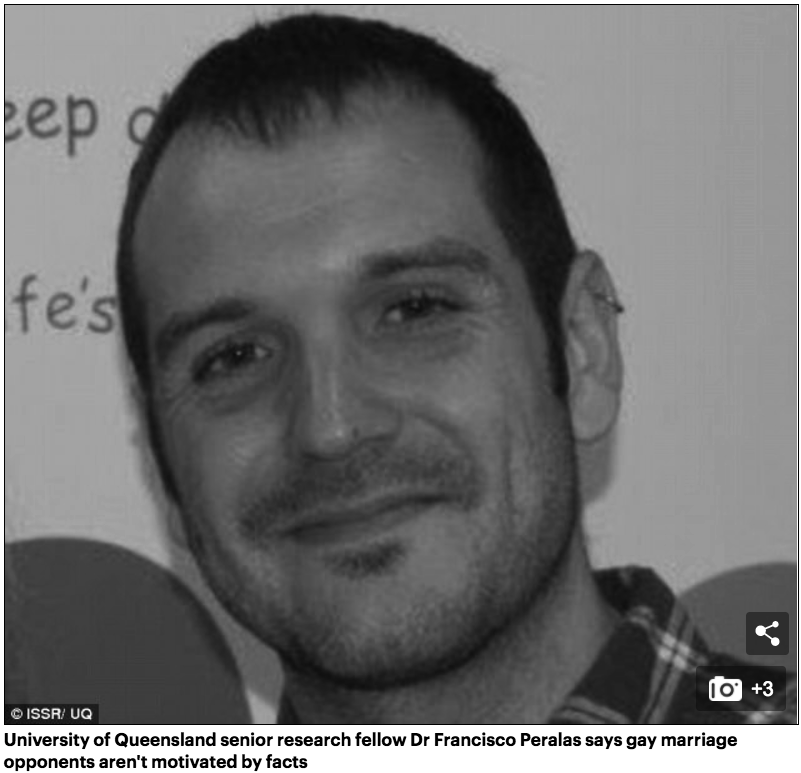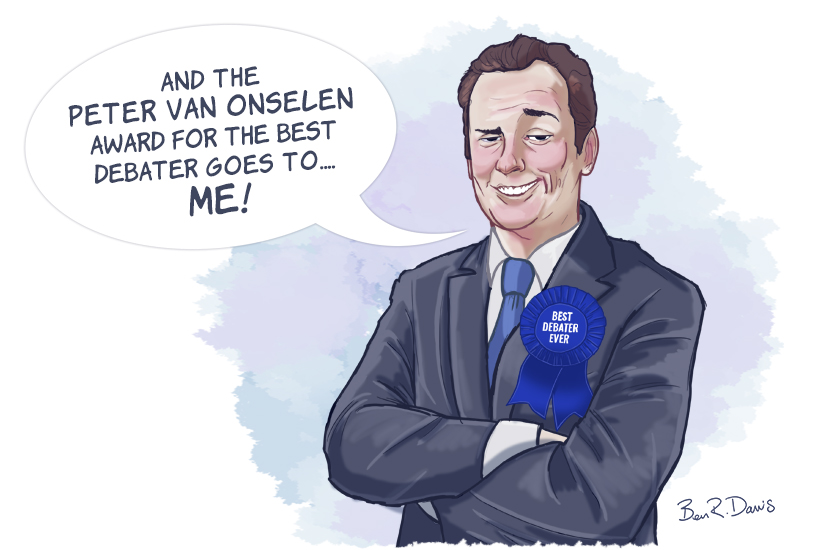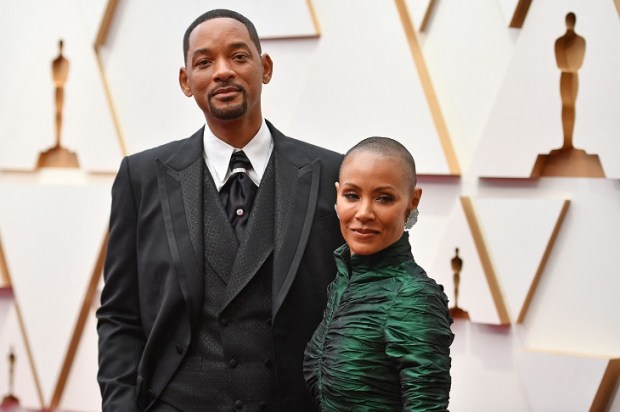Peter Van Onselen is a timely reminder that the ‘academic aristocracy’ is alive well in our land. He recently tried to educate the Australian public in the finer points of debating, particularly those who are too obtuse to vote ‘yes’ in redefining marriage. And he should know because, as he himself delights in telling us, he’s participated in the Australasian and world debating championships.
Still, it’s always nice to receive some crumbs from the master’s table so that we intellectually impoverished ‘no’ voters have something to chew on. One crumb that he has thrown us is actually a gratuitous insult: our apparent inconsistency in daring to oppose the secular juggernaut of same-sex marriage. Van Onselen declares: “Shouldn’t a religious baker who doesn’t want to make a cake for a gay wedding be consistent and also refuse to do so for a pair of fornicators?”
There’s a simple answer to that question. Although my reasoning may sound a little basic, please bear with me because a lot of us ‘no’ voters are apparently cognitively impaired, or at least that’s what an academic at University of Queensland thinks [see further below]. Actually, the real reason an evangelical Christian baker in Ireland gave for not baking a cake in support of the gay marriage campaign (rather than a gay wedding) was that it contradicted his religious beliefs. As he and his wife said, “It was not about the customer, it was about the message.” But let’s not allow the truth to get in the way of Van Onselen’s debating point.
However, I digress. According to Van Onselen, the reason why ‘no’ voters are obfuscating in their arguments is that we already know our case is lost. Therefore, our overarching strategy is simply to muddy the waters and so, as in a good old-fashioned GPS private school debate, (which Van Onselen knows all about) “overcome a bad adjudicator with bluff and bluster and steal the result.” In particular, we are being “deliberately disingenuous” using five faulty lines of reasoning.
- The slippery slope. Just the mention of this phrase sends ripples of mirth through a university tutorial. But why is it so illogical to consider what the consequences (positive or negative) of making a certain decision might be? I mean, why are we even seeking to change the Marriage Act if there is going to be no effect? Those on the ‘yes’ side think that there’s certainly going to be some benefit – preventing homophobic bullying, addressing inequality and injustice…so why can’t we also consider how same-sex marriage might affect freedom of speech, compromise faith observance and interfere in religious institutions? Van Onselen, in his one-eyed fashion, wants it all his own way.
- False equivalence. Five years ago, Cory Bernardi was pilloried for arguing that redefining marriage opens up a whole new range of sexual possibilities such as polyamory (Van Onselen doesn’t mention this. Was that because it is now being seriously discussed) as well as bestiality? To be fair, Senator Bernardi didn’t compare gays to animals as Van Onselen is suggesting. He was merely asking, “What ethical framework does one use for saying that bestiality is wrong?” The moral philosopher Peter Singer, for instance, doesn’t think that there is anything inherently wrong with it.
- The red herring. No surprise here, Tony Abbott is the chief perpetrator according to Van Onselen. Our former Prime Minister is always going on about those pesky side issues – which apparently have absolutely nothing to do with the debate – such as Safe Schools, political correctness and the rights of children. Van Onselen never looks beyond our shores to what has changed in places like Massachusetts, Ireland, UK, or in particular, Canada. Not mentioning what has happened in these jurisdictions is curious in a person who fancies himself as a research professor in history and current political affairs.
- The straw man. This was an interesting one for me since one of my friends commented, “How could someone who accuses us of the ‘straw man’ argument so brazenly put whole straw armies himself into the field?” It’s a good point. But it’s not the ‘straw men’ (leaving aside the bigoted male gender exclusive pronoun he employs for now) that I’m worried about. It’s the real men and women who are supporters of the ‘yes’ campaign who violently attack and shout down anyone who tries to present an alternative view. I wonder if he’s been to Sydney University lately?
- Ad hominem. Finally, Van Onselen says that it’s illegitimate to make it personal but that’s precisely what he does when he states that “the arguments being used are often deliberately disingenuous, designed to con.” Really? So, that’s how everyone who votes ‘no’ is being motivated to act? He never sought my opinion on why I am saying ‘no.’ What’s more, he goes on to state: “The argument that children are at risk from same-sex marriage falls into this category too – never mind the irony of what has been done to children for decades by religious institutions opposed to same-sex marriage…” I wonder if he is even aware of the irony as to what he has done here? Writing off an entire institution because of a fault it has committed in one area is just as big an ad hominem argument as if it were an individual. Why not engage with the advisability of same-sex marriage though? A recent petition signed by over 630 doctors and 25 professors and associate professors of medicine to the Australian Medical Association on this very issue certainly does. Or is Van Onselen going to attack the doctors’ personal integrity just as the 6,000 individuals in the GetUp! petition tried to do in seeking the deregistration of Dr Pansy Lai for appearing in the ‘no” campaign?
The greatest irony of all here is that Van Onselen might be guilty of committing the very same sin he is accusing those in the ‘no’ campaign of doing. And that is, of muddying the waters. Wouldn’t it be great if we could have an old-fashioned debate about this sometime? And then the likes of Van Onselen, the research professor, international debater and media star, could give us all a ‘masterclass’ in just how stupid we really are.
But just when I thought that Peter Van Onselen had a monopoly on looking down his intellectual nose at anyone who would contemplate voting ‘no’ to redefining marriage, you won’t believe it, but some‑‑unheard of‑‑academic from the University of Queensland has come along and spun an argument going in the same general direction. ‘No’ voters are essentially idiots. He claims that the underlying reason why most people won’t get on board with the LGBTIQ juggernaut is because they just don’t have the mental capacity for doing so.
According to the ABC, The Australian Financial Review and The Daily Mail, that’s precisely what Dr Francisco Perales, a Brisbane academic who specialises in ‘gender and sexuality,’ is saying.
I’m sorry, but I’m starting to think that maybe — just maybe — there’s some kind of latent agenda running here that is designed to dismiss the ‘no’ case as a bunch of obscurantists, debating amateurs and social misfits rather than dealing with the real issues. All behind the veneer of ‘academic objectivity’? But my unproven suspicions aside, Dr Perales postulates that:
Opponents of changing the Marriage Act lacked the cognitive ability to process complex ideas, discern facts from speculation and critically engage with new or diverse viewpoints…Specifically, there is a strong and statistically significant association between higher cognitive ability and a greater likelihood to support equal rights between same and different-sex couples.
Incredibly, he makes even more extreme statements. The Daily Mail goes on to say:
Older people and those from non-English speaking backgrounds were more likely to oppose gay marriage… For the former group, this may be due to cognitive decline, and for the latter it may be due to English not being their first language.
So, let me just summarise what he is saying here. If you vote ‘no’ and you’re from overseas, it’s because you “just don’t speak good like us.” If you’re over 50 and vote ‘no,’ “it’s because you’re starting to lose it mentally.” And if you’re fluent in English as well as somewhat youthful but still vote ‘no,’ it’s because you just don’t have the mental ability to think any other way. Yep, you really can’t make this stuff up.
Seeing how we dumb voters might respond to such a conclusion, Dr Perales serves up a full helping of academic gobbledygook: “The findings do not mean that all those who intend to vote ‘no’ in the marriage ballot have a low level of cognitive ability…[however] opponents of gay marriage were more likely to be less intelligent.” As someone born in Australia, still under the age of 50, and having spent thirteen years in tertiary education, I find it difficult to reconcile the compatibility of those two statements.
How do we, who disagree with same-sex marriage, display evidence of a lack of intellectual aptitude? Well, according to the article that Dr Perales himself wrote for the ABC, we have four main areas of deficit:
- We can’t appreciate evidence-based arguments.
- We cling to philosophical, historical and empirically flawed arguments.
- The ‘no’ campaign is based on emotion rather than reason, and,
- We believe the unsupported claim that children are worse off in same-sex households.
Interestingly, each of these points are backed up by hyperlinks to another published article at, yep, you guessed it, The Conversation. If you’re starting to see a pattern here, you’re not alone. But let’s take each one of these claims in turn.
First, his claim that those who oppose same-sex marriage can’t handle ‘evidence-based arguments.’ I noticed that the author makes the startling claim that:
Not a single study has found children of lesbian or gay parents to be disadvantaged in any significant respect relative to children of heterosexual parents.
That begs the question: How many studies are involved here? What kinds of research methodology have been employed? How have the test groups been selected? Have ethical considerations been taken into account such as the personal interests of the researchers? I think we are all aware of how research studies in the area of social science can be skewed. Readers will no doubt remember the fraud committed in the name of social science through the infamous Kinsey Report.
There are many who are opposed to same-sex marriage who have formed their views on the basis of rigorous medical and social science research. For those who doubt this, the following references will be helpful: here, here, here and here.
Second, it turns out that the “philosophical, historical or empirical” evidence about homosexuality is a single article by Revd. Dr Robyn J. Whitaker of Trinity College, Melbourne, relating exclusively to the Bible. Somewhat embarrassingly for her though, it was quickly pointed out by Rev Dr Lionel Windsor –the lecturer in Greek and New Testament at Moore College, Sydney – that her summary of current biblical scholarship on the issue is “highly inaccurate.” Windsor states:
I was astonished at Whitaker’s claims in her ABC article. To put it bluntly, William Loader’s scholarly article directly contradicts the claims made by Robyn Whitaker in her ABC news article. Thus, Whitaker’s claim that her article “represents a summary of critical biblical scholarship on the issue”, with special reference William Loader, is far from accurate (emphasis his).
If you’d like read a more orthodox examination of the relevant Biblical data though, then see the following.
Third, the ‘no’ campaign is said to be preying on people’s innate fear of change. What’s wrong with thinking through the consequences of making a certain decision? What’s more, how does this make the ‘no’ position based more on emotion than logic? I read about the legislative changes that have taken place in Massachusetts since 2005. I thought I had to be informed as to where this would likely lead. Was that an emotional response? As far as I was concerned, I was acting on a purely rational basis. I wanted to be well informed before I recorded my vote. My desire to research the subject had nothing to do with emotion.
Finally, and of great importance, what about the negative effect on children? Well, the homosexual academic Simon Crouch does a fact check (yes, again it was published in The Conversation) and concludes that there isn’t any evidence to suggest that children would be worse off in a same-sex marriage. However, according to over 630 doctors and 25 professors and associate professors of medicine in Australia, there is a plethora of evidence that suggests something quite different. See the hyperlinks provided above under the first point.
 In the end, I had to laugh. When I looked at the picture which The Daily Mail provided of Dr Perales, I noticed that they had misspelt his name. Now I’m sure that it was an honest mistake. But my theory is, the person who edited the piece is probably one of those elderly, overseas born, mentally impaired types who is going to vote ‘no.’ But who am I to say? I’m no academic.
In the end, I had to laugh. When I looked at the picture which The Daily Mail provided of Dr Perales, I noticed that they had misspelt his name. Now I’m sure that it was an honest mistake. But my theory is, the person who edited the piece is probably one of those elderly, overseas born, mentally impaired types who is going to vote ‘no.’ But who am I to say? I’m no academic.
The thing that strikes me about these two episodes in the past week by Peter Van Onselen and Francisco Perales, is a lack of research and depth in their occasional writings. It behoves us all to listen carefully and think critically whenever we get lectured by our so-called ‘intellectual elites.’
Mark Powell is the Associate Pastor of Cornerstone Presbyterian Church, Strathfield.
Cartoon: Ben R Davis.
Got something to add? Join the discussion and comment below.
Got something to add? Join the discussion and comment below.
Get 10 issues for just $10
Subscribe to The Spectator Australia today for the next 10 magazine issues, plus full online access, for just $10.


























Comments
Don't miss out
Join the conversation with other Spectator Australia readers. Subscribe to leave a comment.
SUBSCRIBEAlready a subscriber? Log in